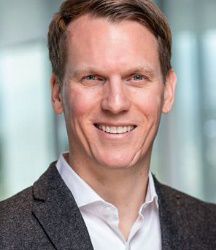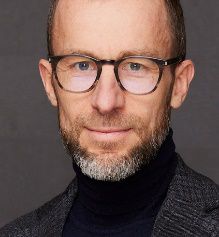- Dentistry is evolving rapidly due to digitalization, personalized medicine, and technological advancements, reshaping the field
- Prof. Dr. Ronald Jung is not only witnessing these changes but actively contributing to the transformation as a leading implantologist and scientist.
- His vision focuses on integrating dentistry with general medicine, leveraging innovation, and ensuring the field remains patient-centered and scientifically validated.
A key opinion leader on global level
Prof. Jung's career is marked by flexibility and relentless curiosity. Originally aspiring to become a professional soccer player or an architect, his path led him through various international research institutions to the forefront of reconstructive dentistry. Today, he is a professor and clinical director at the University of Zurich, has authored over 400 scientific publications, and, as a leading figure in the International Team for Implantology (ITI) and former president of the European Association for Osseointegration (EAO), plays a pivotal role in shaping the future of dentistry.
Dentistry as part of general medicine
One of Jung’s central goals is to integrate dentistry more closely with general medicine. “We don’t just treat missing teeth or dental defects; we treat people with complex health needs,” he emphasizes. The development of saliva tests, for example, could revolutionize dentistry by enabling early detection of serious conditions such as cancer and systemic inflammation.
Digitalization as a gamechanger
Few advancements have influenced dentistry as profoundly as digital transformation. From 3D diagnostics and AI-assisted treatment planning to robotic surgery, possibilities are expanding rapidly. Jung does not see this as a threat to dentists but as an opportunity: “Technology does not replace doctors; it makes them more efficient and precise.” He firmly believes that dentists who fail to adapt will fall behind in the long run.
New roles: Specialists and General Practitioners
With increasing automation, Jung anticipates a shift in the roles within dentistry. While specialists will focus on highly complex cases and complications, general practitioners will take on greater responsibility for holistic health care. He sees the future of the profession in dentists acting as “guardians” of oral and systemic health.
From research to practice: Scientific evidence remains essential
Despite rapid innovation, Jung stresses the importance of scientific validation. “We must adapt methods for clinical validation but not neglect them.” He criticizes the trend of companies releasing products without solid clinical trials and sees digitalization as a tool for generating faster and more precise findings.
The future of implantology: Has the peak been reached?
Some argue that there are no groundbreaking innovations left in implantology. Jung disagrees: “The real potential lies in integrating implantology into a holistic medical approach.” Smaller, less invasive implants and improved materials could further optimize treatment.
A Glimpse into 2050: What will dentistry look like?
In ten years, Jung envisions dentistry becoming even more patient-centered and personalized. Artificial intelligence, big data, and genetic diagnostics will enable highly individualized treatments. Prevention will take center stage, and dentists will be more involved than ever in their patients' overall health.
A new home for dentistry
One of his most ambitious projects is the construction of a state-of-the-art, sustainable dental campus at the University of Zurich, Switzerland. Scheduled for completion in 2030, the facility will feature interdisciplinary research areas, AI-driven diagnostic systems, and interconnected treatment rooms—an example of dentistry’s future.
Prof. Dr. Ronald Jung believes that dentistry is at the beginning of a transformative era, requiring adaptability and openness to change.
He emphasizes that true progress comes from those who actively drive innovation rather than just reacting to it.
His leadership and vision serve as an inspiration for the next generation of dentists, encouraging them to embrace reinvention and forward-thinking approaches.
The Straumann ProTalk hosts

Andreas Utz: Global Head of Business Unit Implantology at Straumann Group. A leading expert in implant dentistry, Andreas brings a wealth of knowledge and a passion for innovation to the podcast.

Dr. George Raeber: Global Head of Research & Development and Innovation at Straumann Group. With his extensive experience in the dental industry, George offers unique insights and thought-provoking perspectives.


